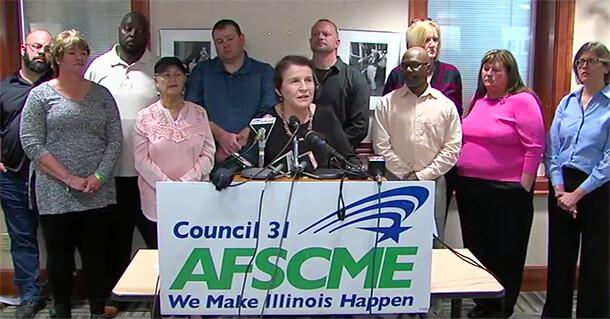Roberta Lynch announces strike vote results
AFSCME Council 31 Executive Director Roberta Lynch made the following remarks at a news conference announcing the results of the state employees’ strike authorization vote, which took place from January 30 to February 19, 2017.
 “I am Roberta Lynch, executive director of AFSCME Council 31. Our union represents some 38,000 public service workers in Illinois state government. AFSCME members protect kids, care for veterans and the disabled, respond to emergencies, help struggling families and much more.
“I am Roberta Lynch, executive director of AFSCME Council 31. Our union represents some 38,000 public service workers in Illinois state government. AFSCME members protect kids, care for veterans and the disabled, respond to emergencies, help struggling families and much more.
Here with me today are state employees who are elected by their co-workers as leaders in their local unions and as members of the AFSCME Bargaining Committee. You will hear from some of them shortly.
Let’s be clear. We have come to this juncture for one reason only: The refusal of Governor Rauner to negotiate with our union.
More than a year ago, in January 2016, the Rauner administration broke off negotiations and walked away from the bargaining table. Ever since, the governor has been trying to force his extreme terms on state employees.
Our members are not willing to accept that. We’re willing—more than willing—to work to find common ground; but we won’t just roll over.
Time and again AFSCME has made clear that our union is prepared to continue to negotiate and to seek compromise—because that is in the best interest of the people of Illinois—and that state employees are willing to do their part to address the state’s fiscal woes. We demonstrated that commitment very powerfully last month when the union bargaining committee took the initiative to put forth a settlement framework that included a four-year wage freeze.
But just as Governor Rauner has stubbornly refused to work constructively with legislators to make sure that our state has a budget unless his own demands are met, so has he refused to negotiate with our union to reach a contract settlement, acting out of his own deep hostility to the right of workers to join together in unions, rather than what is best for the state of Illinois.
Rauner’s unreasonable demands would take $10,000 from the pocket of the average state worker. He would do that by making employees pay 100% more than they’re paying now for health insurance in conjunction with a four-year pay freeze.
The governor also insists on doing away with the common-sense standards in the union contract that prevent irresponsible outsourcing of public services and jobs. Bruce Rauner wants a blank check to privatize public services for private profit.
Because of Governor Rauner’s unwillingness to compromise, his refusal to even attempt to find common ground, for the first time in our union’s history, state employees have been forced to consider going out on strike. We’ve said time and again that our members do not want to strike. They are keenly aware of how disruptive a strike would be, both to those who rely on the services they provide and to their own families.
But they are also keenly—and painfully—aware of how damaging the governor’s extreme terms would be to the economic security of their families and to their rights and safety in the workplace.
So over the past three weeks, AFSCME members have voted on whether to authorize their elected representatives on the union bargaining committee to call a strike.
Voting was held at more than two hundred locations in every corner of the state at just about every hour of the day, and even the night. Despite the Rauner Administration’s threats, intimidation and misinformation, union members cast their ballots to make their voices heard.
Today we are here to announce the outcome—81% of members voted YES to give their bargaining committee the authority to call a strike if no other path forward can be found.
Our commitment to fairness is strong and the message to the governor is clear: State workers don’t want to strike and we are willing to compromise and do our part, but if Governor Rauner continues to refuse his legal obligation to bargain in good faith, if the governor tries to impose his unreasonable demands, he risks a strike that would shut down state government, and he alone bears responsibility for the harm a strike would cause."